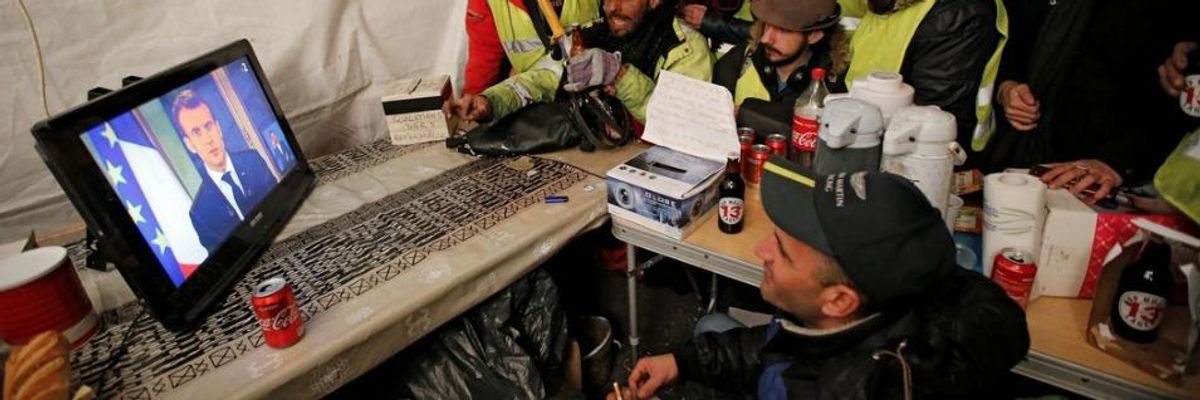Following four weeks of "Yellow Vest" protests which have erupted into violence at times, French President Emmanuel Macron indicated Monday that his government can no longer ignore the demands of hundreds of thousands of citizens--announcing a minimum wage increase and a cancellation of a tax on retirees, but still refusing to relent on one of his most widely-criticized tax reforms.
In a pre-recorded televised address, Macron told the country that the minimum wage would be raised by EUR100, or $113, per month. As part of the "concrete measures" he said must happen to alleviate the suffering of low- and middle-income French households, a planned tax on pensions under EUR2,000 will be canceled and overtime pay will be tax-free.
The announcement follows weeks of protests which first began in rural areas but have spread across the country, with Parisian officials calling for a lockdown over the weekend after more than 100,000 protesters poured into the city's streets. More than 1,200 demonstrators were arrested on Saturday.
On social media, some observers applauded the extreme measures taken by the demonstrators and pointed out that Macron would have been able to ignore the demands of the Yellow Vests if they hadn't forced him to relent.
The exact focus of the protests has shifted since they began in mid-November, but central to the message of the Yellow Vests is anger over what they see as Macron's government "for the rich."
The government was forced to suspend a fuel tax last week, addressing the original reason for the demonstrations. Commuters from rural areas had grown angry that they would be far more affected by Macron's climate policy than corporate polluters and wealthy people in Paris and other cities. By the time Macron announced that the tax would be delayed, healthcare workers and students had joined the demonstrations to decry working conditions and education reforms.
Macron's address Monday appeared as an urgent attempt to regain control and trust in a country where more than two-thirds of French voters now approve of the Yellow Vests.
"I may have given you the impression that this was not my concern, that I had other priorities," Macron told the nation. "I take my share of responsibility."
But Macron refused to budge on his massive cut to the government's "wealth tax," which he introduced last year, cutting the taxes of the richest French households by 70 percent.
Previously, organizers denounced Macron's concession regarding the fuel tax as offering the French only "crumbs," and the Yellow Vests suggested Monday that while they've noted their progress, with the "wealth tax" cuts still in place, they hope for further movement from the president.
Thierry Paul Valette, an organizer of the demonstrations, told France 24 that the minimum wage hike represents the "start of dialogue certainly."
"Meanwhile," he said, "we continue the mobilizations."
